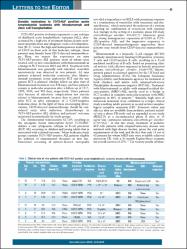Durable remissions in TCF3-HLF positive acute lymphoblastic leukemia with blinatumomab and stem cell transplantation

Göster/
Erişim
info:eu-repo/semantics/openAccessTarih
2019Yazar
Mouttet, BriceVinti, Luciana
Ancliff, Philip
Bodmer, Nicole
Brethon, Benoit
Cario, Gunnar
Chen-Santel, Christiane
Elitzur, Sarah
Hazar, Volkan
Kunz, Joachim
Moericke, Anja
Stein, Jerry
Vora, Ajay
Yaman, Yöntem
Schrappe, Martin
Anak, Sema
Baruchel, Andre
Locatelli, Franco
von Stackelberg, Arend
Stanulla, Martin
Bourquin, Jean-Pierre
Üst veri
Tüm öğe kaydını gösterKünye
Mouttet, B., Vinti, L., Ancliff, P., Bodmer, N., Brethon, B., Cario, G. ... Bourquin, J.P. (2019). Durable remissions in TCF3-HLF positive acute lymphoblastic leukemia with blinatumomab and stem cell transplantation. Haematologica, 104(6), E244-E247. https://dx.doi.org/10.3324/haematol.2018.210104Özet
TCF3-HLF-positive leukemia represents a rare subtypeof childhood acute lymphoblastic leukemia (ALL), characterized by a high rate of treatment failure despite treatment intensification and allogeneic stem cell transplantation (SCT). Given the high and homogeneous expressionof CD19 on blast cells of this leukemia subtype, thesepatients may benefit from CD19-directed immunotherapy. Here, we report the experience on nineTCF3-HLF-positive ALL patients, most of whom weretreated early in first consolidation with blinatumomab asa bridge to SCT between 2015 and 2018. Treatment withblinatumomab was generally well tolerated; reversibleneurotoxicity was observed in two patients. All ninepatients achieved molecular remission after blinatumomab treatment; seven underwent SCT and for onepatient SCT is planned. Median follow up after start ofblinatumomab treatment was 342 days, and four patientsremain in molecular remission after a follow up of 1317,1292, 1245, and 342 days, respectively. Three patientsdied because of infectious complications not directlyrelated to blinatumomab, because they occurred eitherafter SCT or after emergence of a CD19-negativeleukemia clone. In the light of these encouraging observations, CD19-directed immunotherapy should be considered early after induction chemotherapy inTCF3-HLF-positive ALL children and patients’ outcomemonitored systematically by study groups.

















